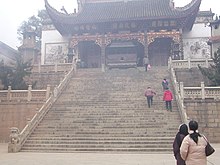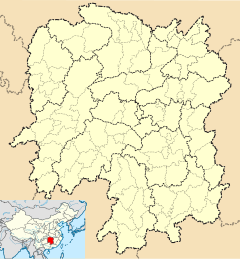| Taogong Palace | |
|---|---|
| 陶公庙 | |
 The Main Hall of Taogong Palace. The Main Hall of Taogong Palace. | |
| Religion | |
| Sect | Taoism |
| District | Langli Subdistrict, Changsha County |
| Province | Hunan |
| Location | |
| Country | China |
  | |
| Geographic coordinates | 28°11′12.282″N 113°7′4.728″E / 28.18674500°N 113.11798000°E / 28.18674500; 113.11798000 |
| Architecture | |
| Founder | Tao Dan (陶淡) |
| Date established | AD 504 |
Taogong Palace (simplified Chinese: 陶公庙; traditional Chinese: 陶公廟; pinyin: Táogōngmiào) is a Taoist temple located on the west side of Linxiang Hill (临湘山), beside the Liuyang River, in Langli Subdistrict, Changsha County, Hunan, China. The temple covers a total area of 7,333.333 square metres (78,935.34 sq ft), with more than 1,852 square metres (19,930 sq ft) of floor space.
History
In honor of Tao Kan, Taogong Palace was first built by his grandson Tao Dan (陶淡) in 504, in the 3rd Year of Period Tianjian (502–519) in Liang dynasty (502–587).
The temple was badly damaged during the Cultural Revolution and almost all of plaques which written by historical famous people were either removed, vandalized or destroyed. In 1988, the temple was restored by the municipal government. Then an extensive renovations began in 1994. It has been designated as a "provincial level key cultural heritage" in 1996.
The eldest things in the temple is a 1000-year-old camphor tree.
Architecture
The temple includes the following halls: Shanmen, Operatower, Stone steps, Main Hall and Side Palace Hall.
Main Hall
The Main Hall are generally two-room buildings (the front hall and the back hall) at the central axis of temples in the highest point of the temple. Tan Kan and Guan Yin are enshrined in the front hall and the back hall respectively. Its surface paved by granite stones. A plaque which was written by Zhu Xi on the Main Hall. It reads "德化无疆" in Chinese.
Transportation
- Take bus No. 169 to Shaoguang Community Bus Stop (韶光社区站)
- Take bus Xingsha 103 to Xingsha No. 2 Hospital Bus Stop (星沙二医院站)
References
- 湖南长沙陶公庙. daoisms.org (in Chinese). 2015-10-13.
- 八旬老人向图书馆捐赠自创作品集 反映地方风情被收藏. Sina (in Chinese). 2016-06-29.